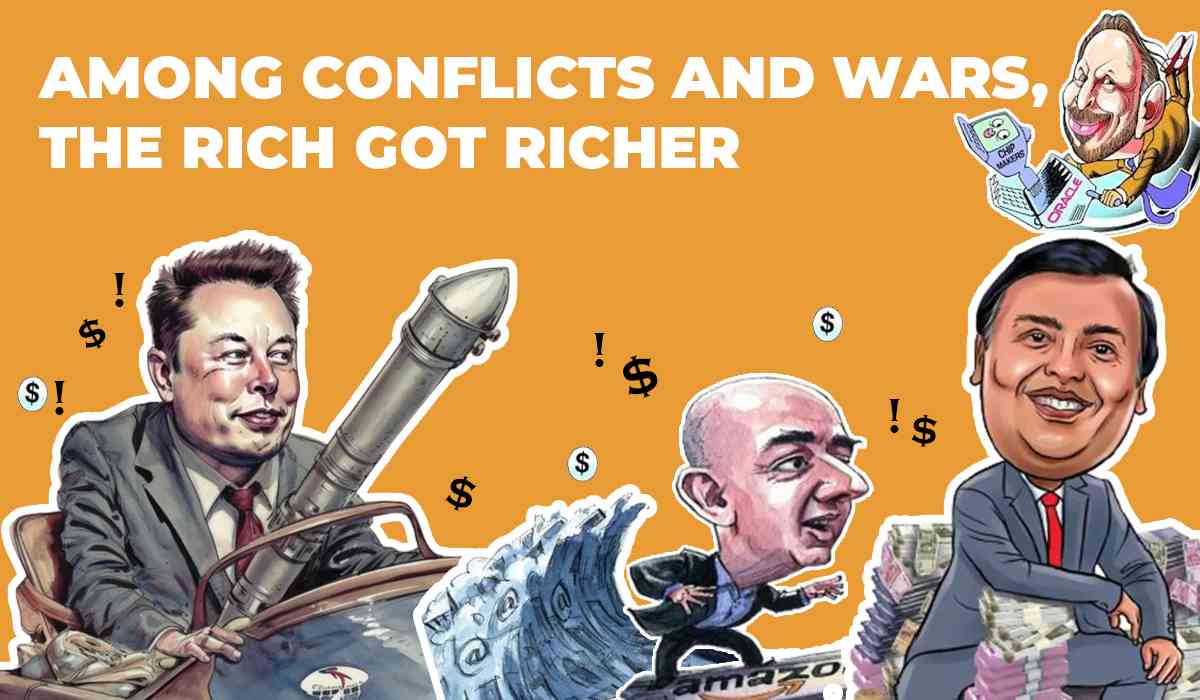The enormous wealth gap that gets even more pronounced during times of international conflict is starkly illustrated by the Forbes billionaire list. A few people on the 2024 list see their fortunes soar while the rest of the world watches in terror. Let's investigate this phenomenon in some detail and see how these people benefit from war.
Pandemic Profiteering: A Double-Edged Sword
The COVID-19 pandemic was not only a health emergency; it was also a financial one. However, in the midst of the pandemic, the net worth of some of the richest people on the planet increased dramatically. Tech giants like Elon Musk (ranked #2 on Forbes 2024) saw the price of Tesla's shares soar as the demand for electric vehicles increased during disruptions to the supply of conventional fuel. Similarly, as more people turned to e-commerce for necessities, Jeff Bezos (#3 on Forbes 2024) saw Amazon's dominance in online shopping solidify.
These tales demonstrate the contrast between the daily hardships of common people and the ultra-rich's financial fortitude, which allows them to take advantage of financial crises to amass even more wealth.

Profiteering Beyond the Headlines
The reach of war profiteering extends beyond traditional arms manufacturers and defence contractors. Here's a glimpse into how some lesser-known, but significant, beneficiaries of the Forbes list leveraged the war:
Tech Titans with indirect ties:
Elon Musk (Net Worth: $195 Billion): While Tesla doesn't directly manufacture weapons, it has benefited from defence contracts. SpaceX is expanding its relationship with U.S. intelligence and military agencies by winning a $1.8 billion classified contract with the U.S. government in 2021. The company plans to use the funds from the contract to boost its revenue in the coming years and has also expanded its secretive satellite programme called Starshield for national security customers.
_1712155011.png)
Essential service providers:
Jeff Bezos (net worth: $194 billion): Amazon Web Services (AWS) provides cloud computing services to government agencies, including the Department of Defence. The exact figures for AWS's government contracts are not publicly available, but a 2022 report by Synergy Research Group estimated that AWS holds a 33% market share in the global cloud infrastructure market for the public sector (source: Synergy Research). During conflicts, the demand for secure data storage and communication surges, potentially benefiting AWS's dominance in this sector.
Larry Ellison (net worth: $141 billion): Oracle provides critical software and database solutions to government agencies around the world, including defence departments. Their software is essential for managing logistics, intelligence, and other sensitive information during wartime. While specific wartime profit figures are unavailable, Oracle's total revenue in 2023 was $46.9 billion, and the defence sector is a significant customer base for the company (source: Oracle Investor Relations).
_1712160590.png)
From left to right:Bezos, Ambani, Larry Ellison
Mukesh Ambani (net worth: $116 billion): While not directly involved in weapons or military contracts, Ambani's Reliance Industries conglomerate spans sectors like telecommunications and energy. Conflicts often disrupt global energy markets and supply chains, causing fluctuations in oil prices. In 2023, the Russia-Ukraine war caused a surge in oil prices, leading to a record-breaking profit of $59 billion for ExxonMobil, another major oil and gas company (source:ExxonMobil). While Reliance Industries' financial data for 2024 isn't available yet, the company's profits are likely to be impacted by similar wartime fluctuations in the energy market.
The Financiers: Investing in War (A Potential Connection)
The financial sector also plays a role in wartime profiteering. While no billionaires on the 2024 Forbes list directly manage hedge funds heavily invested in wartime industries, some like:
Warren Buffett (Net Worth: $133 Billion): His investment strategies often involve defence-related stocks and companies. Berkshire Hathaway, his conglomerate, might have holdings in various industries, including defence contractors. However, due to diversification and privacy laws, it's challenging to pinpoint the exact percentage of Berkshire Hathaway's portfolio invested in wartime-related industries.
Beyond the Battlefield: The Ethical Grey Area
The connections between billionaires and wartime profits can be complex and nuanced. Not all billionaires benefit directly from war. For instance, Bill Gates (#6 on Forbes 2024) leverages his wealth for philanthropic efforts focused on global health and security challenges, even those related to conflicts. However, the wealth and influence of many billionaires ripple through various sectors, including those shaped by geopolitical events.
_1712160980.png)
The Human Cost and Ethical Concerns
The issue of war profiteering remains a complex one, raising significant ethical concerns. While some argue that wartime industries are necessary for national defence and preparedness, others point to the human cost of such profiteering.
Inflated Military Spending: Profiteering can incentivize inflated military budgets and an arms race mentality between nations. This can divert resources away from social programmes and diplomacy, potentially hindering peaceful conflict resolution.
Prolonging Conflicts: Companies that profit from war may have a vested interest in prolonged conflicts, creating a perverse incentive that undermines efforts to achieve peace.
The ethicality of profiting from human suffering and destruction is a major point of contention.
The vast wealth accumulated by some during wartime stands in stark contrast to the devastation and suffering endured by many. While the complexities of national security and defence are undeniable, fostering a more ethical and sustainable approach to war and peace remains a critical challenge for our times.
Increased Transparency: Greater transparency in government defence spending and arms deals can help shed light on potential conflicts of interest. Public disclosure of wartime contracts and beneficiaries can spark public discourse and hold governments accountable.
Investment Diversification: Investors and institutions can consider diversifying their portfolios away from companies that primarily profit from wartime activities. This can create a powerful market signal and pressure corporations to consider the ethical implications of their operations.

Supporting Peacebuilding Efforts: Resources currently directed towards wartime industries could be redirected towards peacebuilding initiatives, promoting diplomacy, and conflict resolution. Funding peacebuilding efforts can help address the root causes of conflict and create a more sustainable future.
Public Discourse: Open discussion and public awareness can help raise ethical concerns about war profiteering and its impact on global security.
PC: Pixabay, IStock
ⒸCopyright 2024. All Rights Reserved Powered by Vygr Media.

























